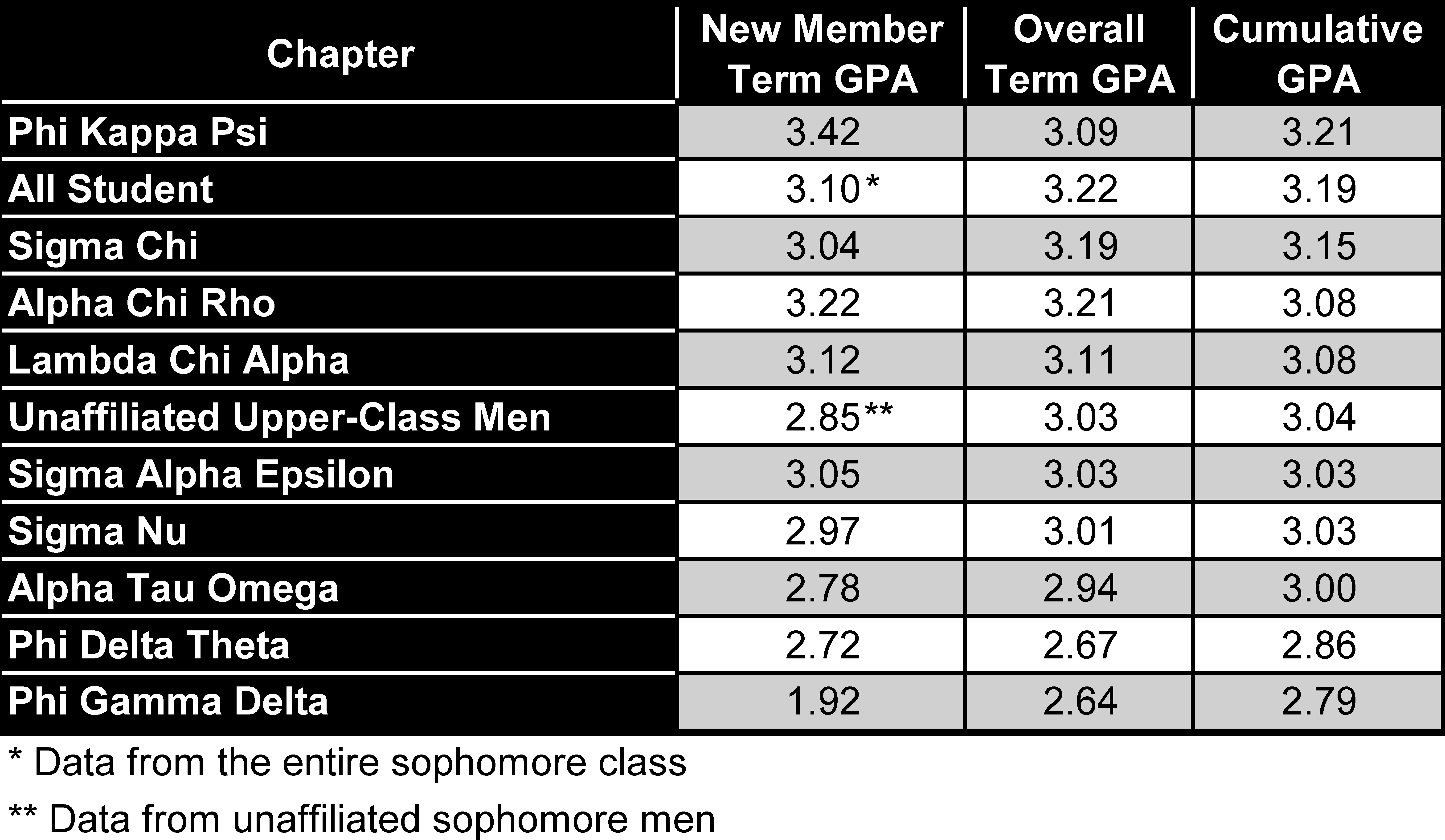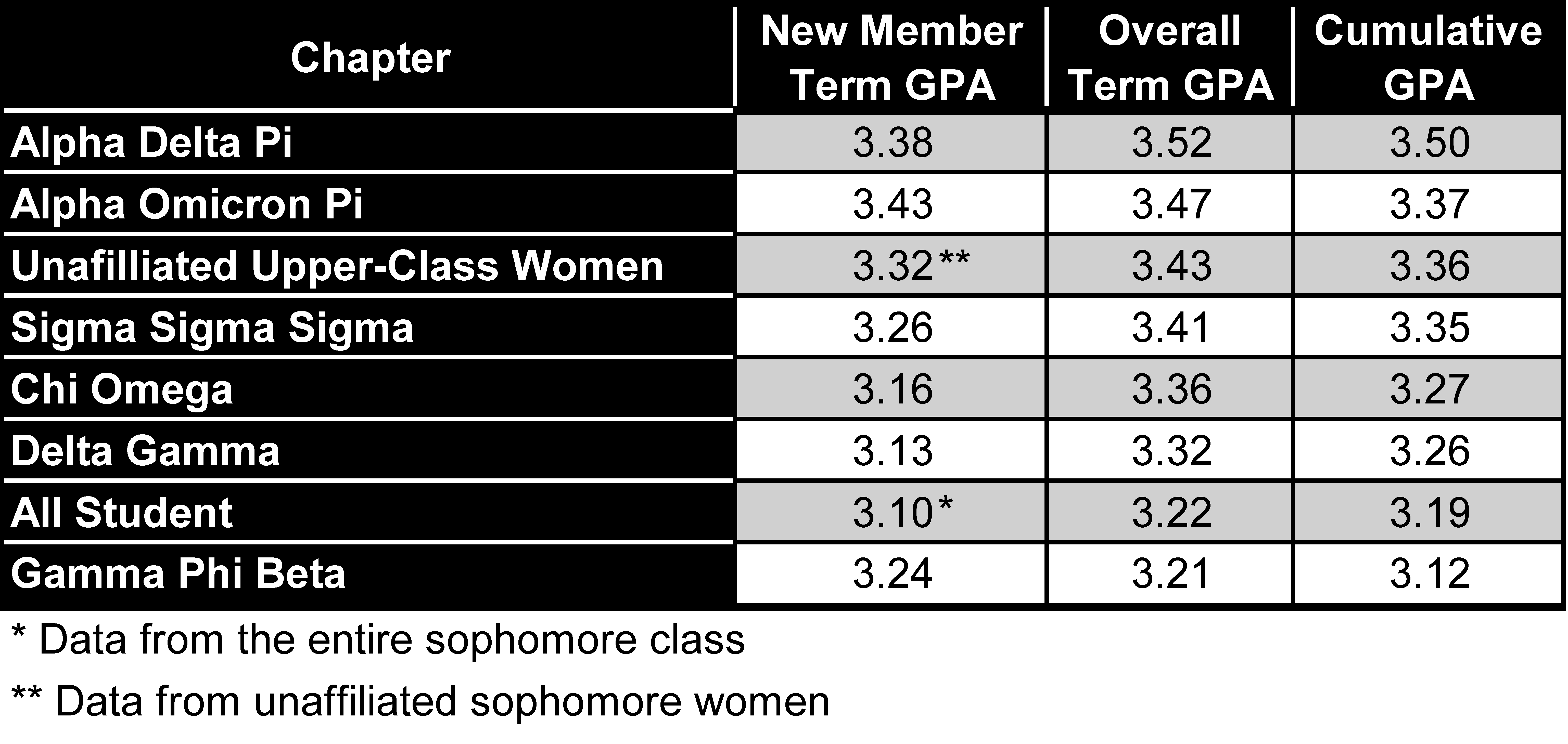By Benjamin Pontz, Managing News Editor
Along with the chapter evaluations, the Office of Student Activities & Greek Life (OSAGL) released fall 2017 grade reports for Greek organizations. Sororities posted a 3.39 cumulative average for the fall semester, an increase from 3.34 the previous spring, while fraternities posted a 3.00 cumulative average for the fall, a decrease from 3.05 the previous spring.
Alpha Delta Pi led all Greek organizations by recording a 3.52 term average and was followed by Alpha Omicron Pi with a 3.47 and Sigma Sigma Sigma with a 3.41 for the fall 2017; unaffiliated upper class women had a term average of 3.43. The lowest sorority term average – 3.21 by Gamma Phi Beta – tied Alpha Chi Rho, which held the highest fraternity term average.
Sigma Chi recorded a 3.19 term GPA, and Lambda Chi Alpha recorded a 3.11 for the fall semester. Phi Delta Theta and Phi Gamma Delta recorded the lowest two scores among all Greek organizations with 2.67 and 2.64 GPAs respectively.
Phi Gamma Delta’s seven new members recorded an average GPA of 1.92 for the fall semester; to join a fraternity, one must hold at least a 2.5 GPA, while, to graduate, one must hold at least a 2.0 GPA.
“Certainly when you have a new member class GPA that is very low, we want to learn more about what’s going on,” said Joe Gurreri, Director of OSAGL. “We want to see, what was the framework that was used this year? Is the right time allotment in place [for the new member process]?”
He said that OSAGL has had conversations with the chapter’s leadership, alumni organization, and national organization about what contributed to the low performance, and, while he could not discuss specifics, he suggested that, in some cases, outliers can weigh down a mean.
Brandon Casamassima ‘19, President of Phi Gamma Delta, called the 1.92 GPA for new members “unacceptable.”
“It’s a bad outcome for our pledge class, just as it would be a bad outcome for any segment of the student population.” – Brandon Casamassima, President of Phi Gamma Delta
“It’s a bad outcome for our pledge class, just as it would be a bad outcome for any segment of the student population,” he said before noting that disciplinary issues in previous years led to “college prescribed probations, coupled with self-imposed social restrictions coming from within our organization” that created “negative momentum coupled with our lack of social presence” and “impacted our ability to effectively recruit new members in the quantity to which we were historically accustomed.”
Fernando Porras ‘18, who was President of Phi Gamma Delta during the fall, said that the outgoing and incoming executive boards discussed this issue “at great length,” but he said that the chapter does not consider the 1.92 figure to be an “accurate representation of our new members’ commitment to their academics and brotherhood” and also mentioned the potential for outliers to affect the mean.
However, Gurreri said that, while the poor GPA does not mean that all members of the new pledge class performed poorly, based on OSAGL’s evaluation of the data, “outliers did not significantly skew the overall picture,” which is that the “FIJI new member class collectively underperformed in the fall semester.”
“We our [sic] very proud of the work that many of our new members have done academically, though some may have struggled disproportionately for a multitude of reasons beyond the fraternity and beyond the scope of your article,” Porras said. “For those members that have struggled, we consider it our mission to assist them in anyway [sic] possible to further their academic potential and self-improvement.”
Gurreri said that, when new members post low GPAs, hazing is always something that the college considers as a possible factor, but that OSAGL received no reports of hazing involving Phi Gamma Delta this fall.
“To this point, there has been no indication that [hazing] was one of the things that contributed to this year’s low performance, but that’s certainly something to be mindful of,” Gurreri said.
Casamassima acknowledged that hazing has been an issue for the organization in the past, the organization has a zero-tolerance policy for hazing now.
“[W]e have struggled with that issue at various points in our 160-year history on this campus, and we have seen the damage that it can do,” he said. “That is our history, but it is absolutely not who we are now. That is why we have committed ourselves to a new member education program that has zero tolerance for hazing.”
Porras echoed the zero-tolerance policy about hazing and said that, while new members may have an adjustment period, he believes membership in the chapter has a long-term positive impact.
“While we would be willing to concede that there is often times a drop in GPA for new members during their first semester as brothers, we would also note that those deficiencies are often remedied in succeding [sic] semesters,” he said. “We believe that the added commitments associated with joining a new organization and on-boarding oneself into a new social dynamic can take some adjustment at the onset, but ultimately the lifelong bonds, networks, and experiences gleaned by joining a fraternity far outweigh the assimilating period.”
Gurreri said that a variety of options are on the table to improve Phi Gamma Delta’s academic standing moving forward including shortening or reducing the number of events associated with their new member education period and strengthening their engagement with the Office of Academic Advising.
Casamassima said that the chapter has made efforts to increase mandatory study hall hours and engage with faculty advisor Jeffery Williams, Adjunct Instructor of Cinema & Media Studies. But, he stressed that recruiting is a primary area through which the organization hopes to improve its academic standing.
“Unfortunately, we have had a fairly myopic recruitment process in our recent history, which had led to us recruiting a group of men who, while outstanding, are largely cut from the same cloth,” he said. “One of our goals in this year’s recruitment process is to cast a wider net, and to tap into more social networks across campus than we do currently. We would love to count among our ranks men with strong involvement in clubs, athletics, academics, and other campus organizations, because students who are involved and engaged across the campus have a greater likelihood of being engaged brothers, strong students, and pillars of the Gettysburg community.”
In spite of the 1.92 GPA for new members, Phi Gamma Delta earned a “satisfactory” rating for Academic Achievement and Intellectual Engagement and an overall “satisfactory” rating in their 2017 Greek Evaluation.
Overall, four of nine fraternities outpaced the unaffiliated men’s average while two of six sororities exceeded the unaffiliated women’s average.
Gurreri said that the question of whether Greek organizations have a positive effect on academic performance is complicated, but that the college is encouraged by recent progress and the trajectory looking ahead.
“What we believe is that the Greek organizations can provide a good framework for assisting members,” Gurreri said. “We have seen positive growth in our academic success, but, of course, the numbers are still important to us. We recognize that we are still trying to move that number forward.”
Editor-in-Chief Jamie Welch contributed to this report.
Editor’s Note: This is the first of a two-part series on 2017 Greek Evaluations. The second part, discussing Greek evaluations, is available here. (- B. Pontz)



March 21, 2018
Way to drive the point home! [sic]
March 21, 2018
Seems like the entire article is about a member GPA… should be focused on overall fraternity performances
March 27, 2018
So you basically just posted public information for click bait… Someone’s mad they didn’t get a bid. No wonder why.